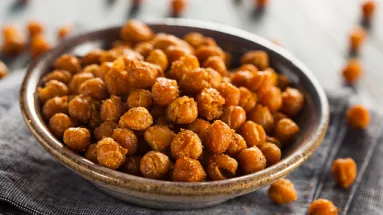These Foods May Help Manage Fatigue
These Foods May Help Manage Fatigue

How you sleep, move, and eat may have a significant impact on your energy levels during your cancer journey. And when it comes to nutrition, it’s not just which foods to avoid. Some foods may help alleviate cancer fatigue by providing essential nutrients that can keep you energized.
Here are three kinds of foods that may impact fatigue:
Foods rich in omega-3 fatty acids
Omega-3 fatty acids may help reduce fatigue in some cancer patients. Inflammation can play a role in cancer fatigue, and omega-3 fatty acids may help lower that inflammation. Fatty fish like salmon and mackerel are good sources of omega-3s. So are nuts and seeds like walnuts, flax seeds and chia seeds.
Protein-rich foods
People with cancer may need more protein to maintain muscle mass and energy. After surgery, chemotherapy, or radiation therapy, protein can play a role in helping to heal tissues and fight off infections. Try including a source of protein at every meal. Options to try include: fish, chicken, turkey, eggs, yogurt, peanut butter, garbanzo beans, peas, lentils, hemp seeds or tofu.
Foods rich in micronutrients like B12, iron and magnesium
Micronutrients like B12, iron and magnesium are critical for energy production in your body. And getting enough of these nutrients can be a challenge for some people living with cancer. For example, you might be low in iron if your treatment destroys too many healthy red blood cells.
To get more iron, try adding beef, lamb, organ meats such as liver, or leafy greens such as spinach or chard to a meal. For vitamin B12, consider animal sources such as fish and shellfish, meat, dairy and eggs (and for vegans, fortified foods such as nutritional yeast or fortified non-dairy milk). For foods rich in magnesium, consider incorporating some dark leafy greens, seeds, legumes, whole grains, or dark chocolate.
Microsteps that may help manage fatigue
Microsteps are small, science-backed steps that may be taken to build new healthy habits. Consider trying one or a few of these Microsteps to help you add some of these nutrients to your daily or weekly diet.
Each experience with cancer and fatigue is unique, and any dietary changes you choose to make should be tailored to your personal health conditions and needs. As always, consult with your care team for the management practices that are best for you.
Picking up one magnesium-rich vegetable you haven’t tried before at the grocery store.
Vegetables are rich in micronutrients like magnesium that may help alleviate fatigue. For veggies highest in magnesium, consider leafy greens like kale, collard greens, and beet greens (the leafy tops of beets).
Enjoying a hard boiled egg or a handful of walnuts as an afternoon snack.
Eggs are a great source of protein, while walnuts are rich in omega-3 fatty acids, both of which may help reduce fatigue.
Adding one iron-rich food source to your next meal.
If you’re feeling fatigued, try having some beef, clams or lentils for dinner. Cancer treatments may cause a reduction in iron, and adding these foods can help replenish what was lost.
Trying an organ meat if you’re feeling adventurous.
Organ meats like chicken liver and kidney are rich in iron, vitamin A, B vitamins, and zinc, which may help manage your fatigue.
Swapping meat for fatty fish in one meal each week.
Fatty fish like salmon and mackerel are rich in omega-3 fatty acids that may lower inflammation and reduce fatigue.
Topping your meal with hemp seeds.
Hemp seeds are rich in both omega-3 fatty acids and protein, both of which can help with energy maintenance when living with cancer.
Developed with Thrive Global













